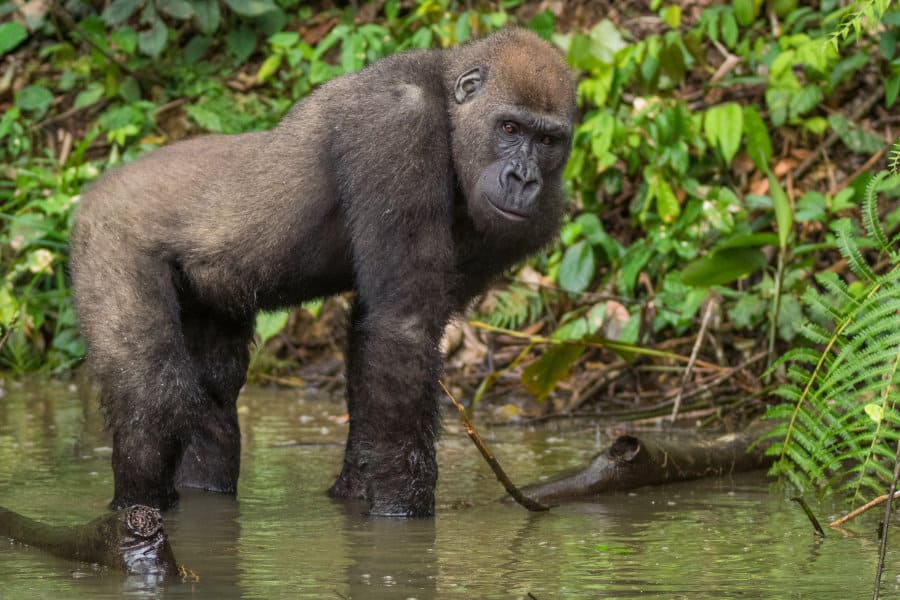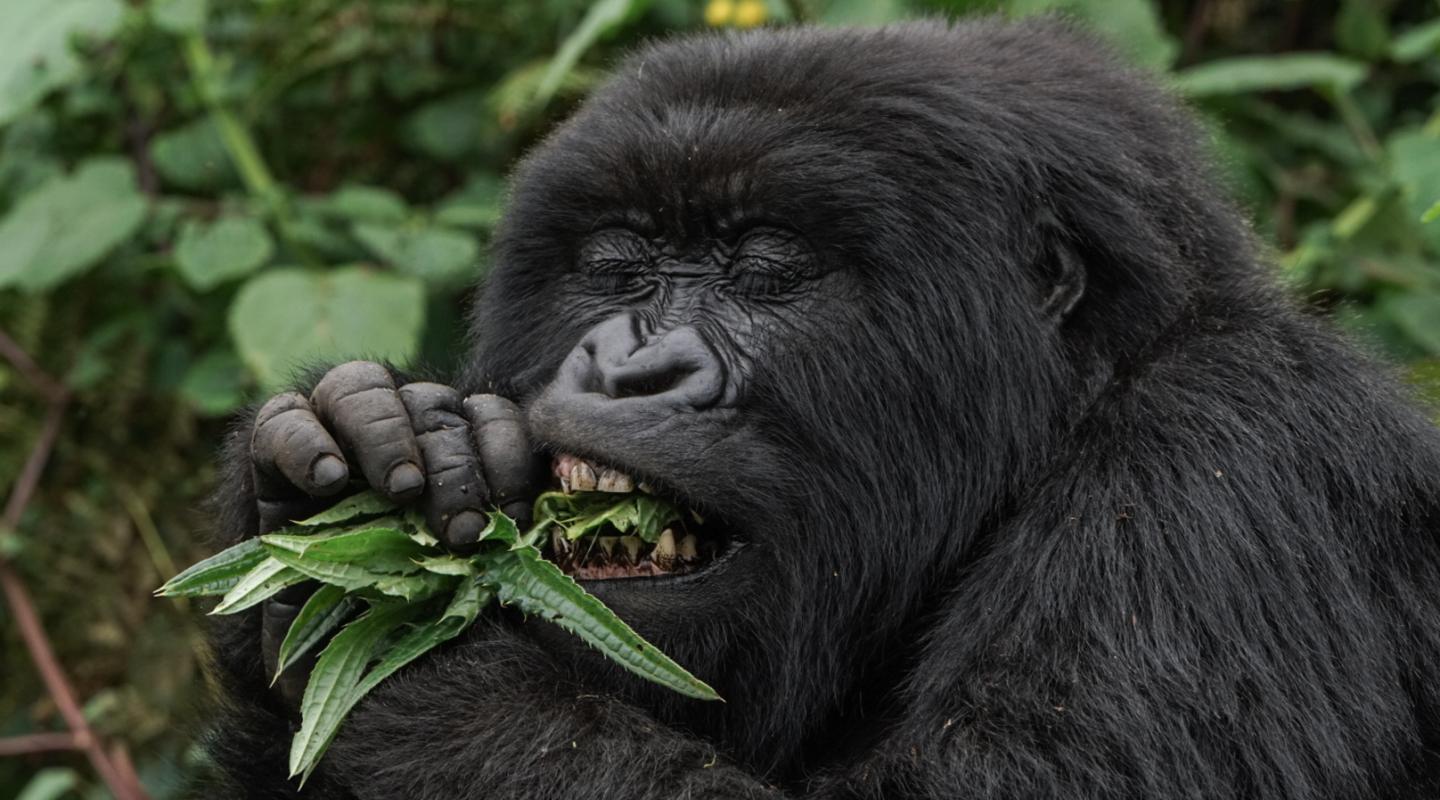Can Gorillas: The Ultimate Guide To Simian Boozing
Can gorillas drink beer? Yes, gorillas can drink beer, but it is not advisable. Beer contains alcohol, which can be harmful to gorillas. Alcohol can cause liver damage, heart problems, and other health issues in gorillas.
Gorillas are not the only animals that can drink beer. Other animals, such as elephants, monkeys, and even fish, have been known to consume alcohol. However, gorillas are one of the few animals that can become addicted to alcohol.
The importance of understanding the effects of alcohol on gorillas is to protect them from the dangers of alcohol abuse. Alcohol can have a negative impact on gorillas' health and behavior. It is important to keep gorillas away from alcohol and to educate people about the dangers of alcohol abuse.
There are a few things that can be done to prevent gorillas from drinking alcohol. One is to keep alcohol out of reach of gorillas. Another is to educate people about the dangers of alcohol abuse and to encourage them to not give alcohol to gorillas.
Can Gorillas Drink Beer?
Gorillas can drink beer, but it is not advisable. Alcohol can be harmful to gorillas and cause various health issues. Understanding the effects of alcohol on gorillas is crucial for their protection.
- Physiological Effects: Alcohol can damage the liver, heart, and other organs in gorillas.
- Behavioral Effects: Alcohol can alter gorillas' behavior, making them more aggressive or unpredictable.
- Addiction: Gorillas can become addicted to alcohol, leading to further health problems.
- Availability: Beer is not readily available to gorillas in their natural habitats.
- Conservation Concerns: Alcohol consumption can contribute to gorilla population decline due to health issues and behavioral changes.
- Education and Awareness: It is essential to educate the public about the dangers of alcohol consumption by gorillas.
Overall, while gorillas can physically drink beer, it is not something that should be encouraged or allowed. The potential risks to their health and well-being far outweigh any perceived benefits. Conservation efforts should focus on protecting gorillas from exposure to alcohol and promoting their overall health and survival.
Physiological Effects
Alcohol consumption can lead to severe physiological effects on gorillas, impacting their overall health and well-being. Understanding these effects is crucial in assessing the potential consequences of gorillas drinking beer.
- Liver Damage: Alcohol can induce liver inflammation, impairing its function in filtering toxins and metabolizing nutrients.
- Cardiovascular Issues: Alcohol can increase blood pressure, weaken the heart muscle, and disrupt heart rhythm.
- Gastrointestinal Problems: Alcohol can irritate the gastrointestinal tract, leading to ulcers, gastritis, and other digestive issues.
- Neurological Effects: Alcohol can impair brain function, affecting coordination, balance, and cognitive abilities.
These physiological effects highlight the detrimental impact of alcohol on gorillas' health. It is essential to recognize these risks and prevent gorillas from consuming alcohol to safeguard their well-being.
Behavioral Effects
Alcohol consumption can significantly influence the behavior of gorillas, potentially leading to aggressive and unpredictable actions. Understanding these behavioral effects is critical in evaluating the consequences of gorillas drinking beer.
- Increased Aggression: Alcohol can lower inhibitions and increase aggressive tendencies in gorillas, making them more likely to engage in fights and confrontations.
- Impulsive Behavior: Alcohol can impair judgment and decision-making abilities, leading gorillas to act impulsively and without regard for consequences.
- Social Disruption: Alcohol can disrupt social dynamics within gorilla groups, causing conflicts and tension among individuals.
- Unpredictability: Alcohol can make gorillas' behavior less predictable, posing risks to both the gorillas themselves and those around them.
These behavioral effects underscore the potential dangers of alcohol consumption for gorillas. It is crucial to prevent gorillas from accessing alcohol to maintain their well-being and protect the stability of their social groups.
Addiction: Gorillas can become addicted to alcohol, leading to further health problems
The addictive nature of alcohol poses a significant threat to gorillas who consume it. Alcohol addiction can lead to a vicious cycle of health issues, exacerbating the harmful effects discussed earlier.
When gorillas become addicted to alcohol, they may prioritize its consumption over essential activities such as foraging for food or caring for their young. This can lead to malnutrition, dehydration, and other health complications.
Moreover, alcohol addiction can damage the brain and nervous system, impairing cognitive function and coordination. This can make gorillas more susceptible to accidents and injuries, further compromising their well-being.
Understanding the addictive nature of alcohol is crucial for preventing gorillas from developing this harmful dependency. Conservation efforts should focus on educating the public about the dangers of alcohol consumption by gorillas and implementing measures to keep alcohol out of their reach.
Availability
The limited availability of beer in gorillas' natural habitats significantly influences their interaction with alcohol. Unlike humans who have easy access to alcoholic beverages, gorillas rarely encounter beer or other fermented drinks in their surroundings.
- Geographical Distribution: Gorillas primarily inhabit dense forests and mountainous regions, far from human settlements and sources of alcohol production.
- Dietary Habits: Gorillas are primarily herbivores, with their diet consisting mainly of vegetation, fruits, and insects. Beer and other alcoholic beverages are not part of their natural food sources.
- Behavioral Patterns: Gorillas live in social groups and have established foraging patterns within their territories. They do not typically explore areas outside their familiar range, further limiting their chances of encountering alcohol.
- Conservation Measures: In many gorilla habitats, conservation efforts and protected areas restrict human activities, including the introduction of alcohol or other foreign substances.
The limited availability of beer in gorillas' natural habitats is a crucial factor in understanding their limited exposure to alcohol and its potential impact on their health and behavior.
Conservation Concerns
The consumption of alcohol by gorillas poses significant conservation concerns due to its detrimental effects on their health and behavior, ultimately contributing to population decline. Understanding the intricate connections between alcohol consumption and gorilla well-being is crucial for developing effective conservation strategies.
- Health Issues and Reduced Survival: Alcohol consumption can lead to a range of health issues in gorillas, including liver damage, heart problems, and gastrointestinal issues. These health complications can reduce gorillas' survival rates and overall population size.
- Behavioral Changes and Social Disruption: Alcohol can alter gorillas' behavior, making them more aggressive and unpredictable. This can disrupt social dynamics within gorilla groups, leading to conflicts and even infanticide, further impacting population stability.
- Impaired Reproductive Success: Alcohol consumption can impair reproductive function in gorillas, reducing their ability to produce offspring and sustain the population. Alcohol can affect hormone levels, disrupt mating behaviors, and cause developmental abnormalities in offspring.
- Increased Vulnerability to Threats: Alcohol-impaired gorillas are more vulnerable to predators and other threats. Their reduced coordination, impaired decision-making, and altered behavior can make them easier targets for poachers or other dangers.
Addressing the issue of alcohol consumption is vital for gorilla conservation efforts. By raising awareness, implementing measures to prevent gorillas from accessing alcohol, and supporting research on the long-term effects of alcohol on gorillas, conservationists can contribute to the protection and recovery of these endangered species.
Education and Awareness
Educating the public about the dangers of alcohol consumption by gorillas is crucial because it raises awareness and understanding of the issue. When people are informed about the negative effects of alcohol on gorillas, they are more likely to take steps to prevent gorillas from accessing alcohol and to support conservation efforts. For instance, educating tourists visiting gorilla habitats about the importance of not offering alcohol to gorillas can help reduce the risk of gorillas consuming alcohol.
Furthermore, education and awareness campaigns can help change attitudes and behaviors towards alcohol consumption by gorillas. By highlighting the potential consequences of alcohol consumption, such as health problems, behavioral changes, and population decline, education can encourage people to make responsible choices and to advocate for the protection of gorillas.
In conclusion, education and awareness play a vital role in addressing the issue of alcohol consumption by gorillas. By informing the public about the dangers of alcohol and encouraging responsible behavior, we can contribute to the conservation and well-being of these endangered species.
Frequently Asked Questions about Gorillas and Alcohol Consumption
This section addresses common questions and misconceptions regarding alcohol consumption by gorillas, providing informative answers to enhance understanding.
Question 1: Can gorillas physically drink beer?
Yes, gorillas have the physical ability to drink beer, but it is not advisable. Their digestive systems are not adapted to process alcohol effectively, and consumption can lead to health issues.
Question 2: What are the potential health risks associated with gorillas drinking beer?
Alcohol consumption can cause liver damage, heart problems, gastrointestinal issues, and neurological effects in gorillas. It can also impair their immune system, making them more susceptible to diseases.
Question 3: Can gorillas become addicted to alcohol?
Yes, gorillas can develop an addiction to alcohol. Alcohol can alter their brain chemistry and lead to compulsive behavior, making it difficult for them to control their consumption.
Question 4: Why is it important to prevent gorillas from consuming alcohol?
Alcohol consumption poses significant threats to gorilla health, behavior, and population stability. It can contribute to health issues, social disruption, reproductive problems, and increased vulnerability to threats.
Question 5: What can be done to prevent gorillas from accessing alcohol?
Preventing gorillas from accessing alcohol requires collaborative efforts. Conservation organizations, park rangers, and the public can work together to educate people about the dangers of alcohol consumption by gorillas, implement measures to keep alcohol out of gorilla habitats, and support research to better understand the long-term effects of alcohol on gorillas.
Question 6: What is the role of education in addressing alcohol consumption by gorillas?
Educating the public about the dangers of alcohol consumption by gorillas is crucial. By raising awareness, changing attitudes, and promoting responsible behavior, education can contribute to the protection and conservation of gorillas.
In summary, understanding the risks associated with alcohol consumption by gorillas is essential for their well-being and conservation. By addressing common questions and misconceptions, we can collectively work towards preventing gorillas from accessing alcohol and safeguarding their populations for future generations.
Transition to the next article section:
Conclusion
In exploring the question of whether gorillas can drink beer, we have uncovered potential health risks, behavioral changes, and conservation concerns associated with alcohol consumption in gorillas. While gorillas physically can drink beer, it is highly inadvisable due to the detrimental effects it can have on their well-being.
To safeguard gorilla populations, education and awareness are crucial. By informing the public about the dangers of alcohol consumption by gorillas, we can encourage responsible behavior and support conservation efforts. Preventing access to alcohol in gorilla habitats, implementing research programs, and collaborating with stakeholders are essential steps towards protecting these endangered species.
- Is Rob Lowe Conservative
- Jonathan Roumie Relationship
- Yumi Eto Jason Love
- Morganvera Onlyfans
- C J Stroud Wife

Can Gorillas Swim? Learn it All!

Mountain Gorilla Diet & Eating Habits (What Do Gorillas Eat)

Gorillas Can Dance Part 1 with Shameen Prashantham The Innovation Show